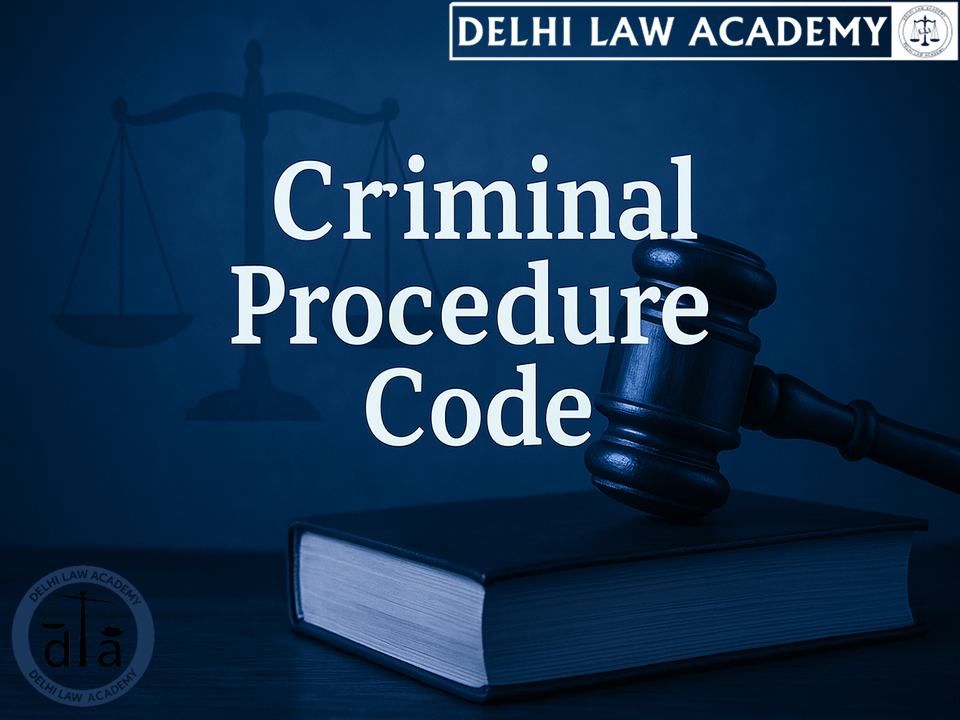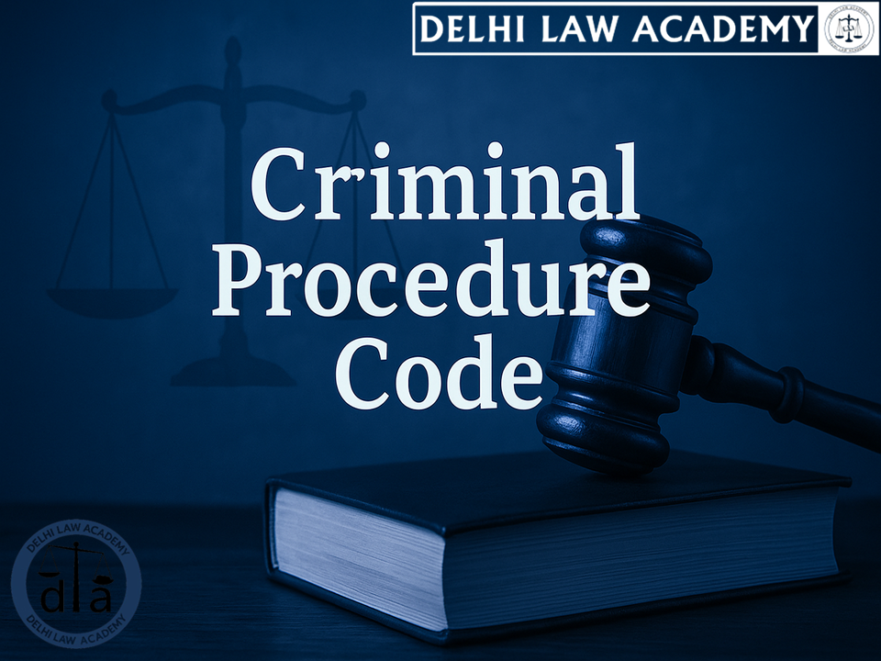
⚖️ Criminal Procedure Code (CrPC) Test 1
The Criminal Procedure Code forms the bedrock of civil law. Its thorough knowledge is a must for all aspirants of RJS, DJS, PCS(J) or any other Judicial Service exam for that matter.
To help such aspirants, Delhi Law Academy Jaipur has launched a series of fully solved tests on all important aspects of this vital part of their syllabus:
📘 CrPC TEST 1 Fully Solved
Q 1. Which section of CrPC deals with medical examination of a victim of rape?
Solution:
Section 164A – Medical examination of the victim of rape
- When an offence of rape or its attempt is under investigation and it is proposed to get the person of the woman examined by a medical expert such examination shall be conducted by a registered medical practitioner with the consent of such woman or of a competent person
Q 2. Whose prior permission is required under CrPC if a woman is to be arrested after sunset and before sunrise?
Solution:
Section 46(4)
- No woman shall be arrested after sunset and before sunrise except in exceptional circumstances
- Where it is so required: prior permission of judicial magistrate of first class shall be obtained by a woman police officer
Q 3. What is the maximum amount of fine imposable by a Magistrate of the First Class?
Solution:
Section 29(2) – Sentences which Magistrates may pass
- A Magistrate of first class may pass sentence of imprisonment for upto 3 years or fine upto 10,000 rupees
Q 4. Provisions relating to plea bargaining are contained in which Chapter of Criminal Procedure Code?
Solution:
Chapter XXIA – Plea Bargaining, w.e.f. 5-7-2006
Q 5. What does in-camera trial mean?
Solution:
- In-camera trial is the opposite of trial in open court where all parties and witnesses testify in a public courtroom.
- In-camera is a legal term that means in private. To hold a trial in-camera means to exclude all spectators or those not legally required from the court room.
Section 327:
- The place in which any Criminal Court is held for the purpose of inquiring into or trying any offence shall be deemed to be an open Court, to which the public generally may have access, so far as the same can conveniently contain them:
- Section 327(2): Inquiry into and trial of offences u/s 376, 376-A to 376-E of IPC shall be conducted in camera
- Note: Inserted w.e.f 25.12.1983
Q 6. Under section 311A of CrPC, who has the power to order a person to give specimen signature or handwriting?
Solution:
Section 311A – [Inserted by Amendment Act 2005 wef 23.06.2006]
- If a Magistrate of first class is satisfied that it is expedient to direct any person including an accused person to give specimen signatures or handwriting for any investigation or proceeding under this Code he may make an order to that effect
Q 7. Which section of CrPC specifies compoundable offences?
Solution:
Section 320(1) – Compounding of offence
- Offences punishable under specified sections of IPC may be compounded by specified persons
Q 8. Which section of Cr PC provides that, in no case the aggregate of consecutive sentences passed against an accused by a Magistrate shall exceed 14 years?
Solution:
Section 31 – Conviction of several offences
- In case of consecutive sentences: it shall not be necessary for the Court by reason only of aggregate punishment for several offences being in excess of punishment which it is competent to inflict on conviction of a single offence to send offender for trial before higher Court
- But in such a case: The offender shall not be sentenced to imprisonment for more than fourteen years
- The aggregate punishment shall not exceed twice the punishment which that Court is competent to inflict for single offence
Q 9. Inherent powers of the High Court are contained in which section of CrPC?
Solution:
Section 482
- Nothing in this Code shall be deemed to limit or affect inherent powers of High Court to make such orders as may be necessary to give effect to any order under this Code or to prevent abuse of the process of any Court or otherwise to secure the ends of justice
Q 10. Payment of compensation to a victim is provided under which section of CrPC?
Section 357A: Victim compensation scheme
- Every State Govt in co-ordination with Central Govt shall prepare a scheme for providing funds for compensation to the victim or his dependents who have suffered loss or injury as a result of the crime and who require rehabilitation.
Q 11. Which section of CrPC empowers a Court to summon a material witness or examine a person present in Court?
Section 311:
- Any Court may, at any stage of any inquiry, trial or other proceeding, summon any person as a witness or examine any person in attendance, though not summoned as a witness…
Q 12. Which Section of the CrPC allows a person making an arrest to seize offensive weapons?
Section 52:
- The officer or other person making any arrest may take from the person arrested any offensive weapons which he has about his person…
Q 13. Which section of CrPC empowers a Magistrate to make arrests?
Section 44:
- When any offence is committed in presence of a Magistrate, whether Executive or Judicial, within his local jurisdiction, he may himself arrest or order any person to arrest the offender…
Q 14. Who can file an appeal under the CrPC against a judgment of acquittal?
Section 378: Appeal in case of acquittal
- Section 378(1)(a): The District Magistrate may direct the Public Prosecutor to present an appeal to the Court of Session from an order of acquittal passed by a Magistrate in respect of a cognizable and non-bailable offence.
- Section 378(1)(b): The State Govt may direct the Public Prosecutor to present an appeal to the High Court from an order of acquittal passed by any Court other than a High Court, or by the Court of Session in revision.
- Section 378(2): Where the offence was investigated by the Delhi Special Police Establishment or by any other agency under any Central Act, the Central Govt may also direct the Public Prosecutor to present an appeal.
- Section 378(4): If an order of acquittal is passed in a case instituted upon a complaint and the High Court grants special leave, the complainant may present such an appeal to the High Court.
- Proviso to Section 372 (Inserted w.e.f. 31.12.2009): The victim shall have a right to prefer an appeal against any order acquitting the accused…
Q 15. Which section of CrPC makes it mandatory for the police officer making arrest to inform about the arrest and place where the arrested person is being held to a nominated person?
Section 50A:
- Every police officer or other person making any arrest shall give information regarding such arrest and place where the arrested person is being held to his friend, relative or nominated person.
Frequently Asked Questions on CrPC 📚
Section 357A of CrPC provides for the Victim Compensation Scheme. Every State Government, in coordination with the Central Government, must prepare a scheme for providing funds for compensation to victims or their dependents.
Section 311 of CrPC empowers the Court to summon any material witness or examine any person present in Court at any stage of inquiry, trial, or proceeding if it is essential for just decision.
Yes. Under Section 44 of CrPC, if an offence is committed in the presence of a Magistrate within his jurisdiction, he may personally arrest or order the arrest of the offender.
Section 378 of CrPC allows appeals against acquittal. District Magistrate, State Government, Central Government, and even the victim (after 2009 amendment) can file appeals under specific circumstances.
Section 50A mandates that every police officer making an arrest must inform a nominated person, relative, or friend of the arrested person about the arrest and the place of detention.
Section 52 of CrPC authorizes any officer or person making an arrest to seize and secure any offensive weapons found on the arrested person.
📚 Continue Your CrPC Preparation
Don’t stop here! Strengthen your knowledge of the Criminal Procedure Code with our other fully solved tests:
📘 Free Study Material for Judiciary Aspirants!
Download our FREE study material prepared by Delhi Law Academy’s expert faculty.
Contact us
📍 Delhi Law Academy – Jaipur Branch
6C, Tower 2, Coaching Hub, Pratap Nagar, Jaipur – 302033
📞 Phone:
+91 9911916552
+91 8447285606
✉️ Email:
contactus@delhilawacademy.com

